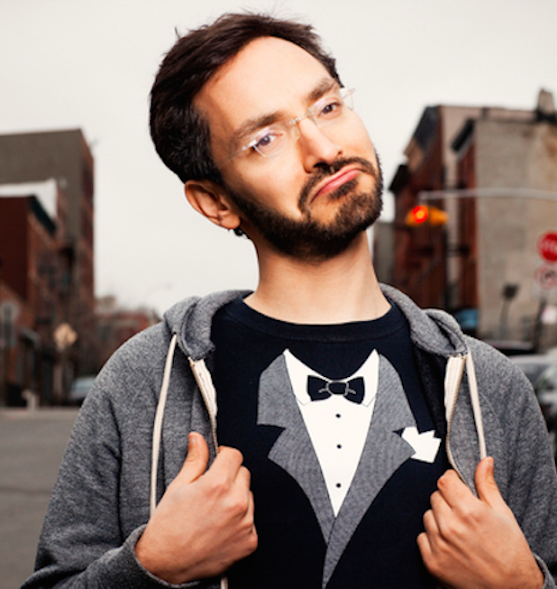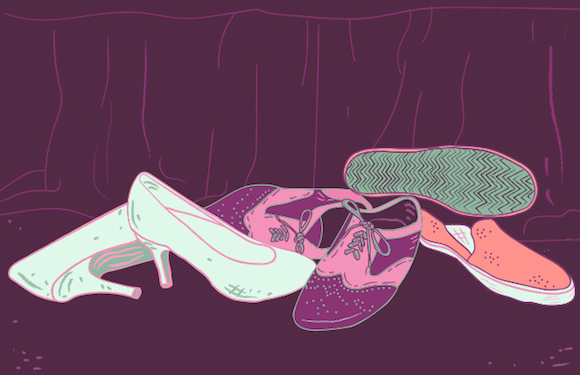
If you’ve been looking for love in Brooklyn lately, you’ve probably been out with at least one person who describes themselves as ‘poly.’ They go on to explain that it’s short for polyamory, and that it means something about loving more than one person at a time. To the rest of us, it just sounds like a free pass to sleep around while still having a steady at home to watch Narcos with.
What makes a ‘poly’ person different from a ‘commitment-phobe?’ Or a cad? We wanted a live poly specimen to break it down for us, so we reached out to friend-of-a-friend Myq Kaplan. He’s a comedian you’ve probably seen on Conan, Letterman, Comedy Central Presents or Last Comic Standing. Kaplan, who’s been in a non-monogamous or ‘poly’ relationship with his current girlfriend for the past 1.5 years—and actually lives with her—sits down with Brokelyn today to discuss the difference between being an evolved emotional being and a sexual opportunist.
‘While I’m on the road, my girlfriend is free to do what she wants in our home city, and I’m free to do what I want wherever I am.’ |
At first glance, Kaplan’s not your idea of a typical Casanova: short, kind of nerdy-looking, and made time for the chat before his morning Tai Chi class. We sit down in his brownstone apartment in Park Slope—where he lives with his current girlfriend—and spend the first couple minutes in silence, while he finishes setting up a P.O. box online.
Once we start chatting, Kaplan makes poly sound reasonable.
“I have, right now, a girlfriend,” Kaplan tells us. “And we’re non-monogamous. The way that my life works is I go on the road, and while I’m on the road my girlfriend is free to do what she wants in our home city, and I’m free to do what I want wherever I am.”
In other words: “The goal is having the cake and eating it too. But also the cake is made of broccoli, so it’s healthy.”
Poly people tend to categorize their mates into primary and secondary partnerships. “Many poly people say, this is my spouse, my primary, my partner, whatever,” says Kaplan. “There tends to be a #1 relationship that gets priority.”
Our specimen explains that poly terms are an organizational method — like binder tabs. “It’s like friendship. Some people have a best friend. Some people have an organization of best friends. Like, this best friend I tell everything to, or this best friend I catch up with once every two years. Nobody’s asking you to pick one. On a basic level it’s just about practicing kindness, understanding, openness, communicativeness,” says Kaplan. “But maybe a hierarchy or an itinerary makes sense for you, if you’re a person who likes schedules.”
One of the basic underpinnings of poly: animal instincts. Poly folks tend to lean into those instincts, rather than suppressing them. It doesn’t mean that everything’s one big orgy. But if you’re poly, then yeah, you’re probably having more sex.
“We’re all animals,” Kaplan says. “Over the course of time, we will all be attracted to more than one person—some of them at the same time as others.”
__________________

‘I have heard of a poly triad raising children. Three people, all together.’ |
There’s no golden rule about disclosure. If you have mindblowing sex with a secondary one night, you might choose to tell your primary partner and you might not. For some poly couples, it’s just don’t-ask-don’t-tell. Kaplan’s relationship is actually if-asked-will-tell.
“Our relationship is what it is: I live with her, I wanna be with her, wanna keep being with her. And when my girlfriend does things that are happening in a different place, it means the same thing to me as if she did things at a different time, like people she used to date before I met her.”
But what happens if the secondary partner suddenly replaces the primary one? “People ask, what if you met somebody and then decided to leave your primary partner for that person? And my answer is: monogamy doesn’t protect you from that.”
Now, Kaplan sees monogamy as being as ambiguous and perhaps even more volatile than its poly counterpart. “There’s this great bit by Doug Stanhope about monogamy,” says Kaplan, “where he says that the best part of a romance is the first moment, the spark of meeting somebody new. He says that getting into a monogamous relationship after you meet somebody is like looking into another person’s eyes and saying, ‘let’s agree never to feel this good again.'”
______________________
 What if you want to get married and have kids, but you’re still dating more than one person pretty seriously?
What if you want to get married and have kids, but you’re still dating more than one person pretty seriously?
“For me, the plan is to only have one committed relationship. And I don’t want kids. If someone else that I’m seeing wanted children, I would not be the person they would have them with. I’ve never heard of someone raising two separate families at the same time, except maybe on Big Love. I have heard of a poly triad raising children, though. Three people, all together.”
Kaplan’s justification for why poly makes sense, even in a marital relationship, goes back to Dan Savage.
“Most marriages will undergo at least a few slip-ups. And according to Dan Savage, that’s a pretty good track record. I honestly think people are less likely to leave you, and you’re less likely to leave, if you’re allowed to meet other people, and get excited about them.”
_________________

At the end of the day, a conversation about relationship structures ends in a kind of stalemate, because like anything in this day and age, it’s a matter of preference. You can be monogamous, monogamish, polyamorous, and everything in between. “If you want to categorically identify as poly, do it,” says Kaplan. “Nobody’s going to come to your house and say, ‘knock, knock, you’re doing it wrong.'”
Leave a Reply



